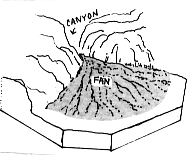 Albuquerque's Environmental Story
Albuquerque's Environmental Story
Educating For a Sustainable Community
Albuquerque's Natural Environment
Alluvial Fans

- TERRAIN - Smooth but fairly steep slopes (to 10% and above) near
mountain front, grading westward to a gently undulating surface with slopes
of 3-5%, and relief tens of feet near arroyos.
- CLIMATE AND AIR QUALITY - Descriptions: see description of
"Volcanic" unit. Comments; like "Volcanic" unit, except
that urbanized areas have major hydrocarbon, carbon monoxide, and photochemical
oxidation air quality problems.
- GEOLOGY - A series of coalescing alluvial fans (Bajada) composed
of sands and gravel and younger formations, deposited in a down-dropped block
(the Rio Grande Rift). Resources and Hazards: resources are limited
to sand and gravel; hazards are flash flooding, mud flows, potential earth
movements along fault scarps, and, in places, poor compaction.
- SOILS - Association: Tijeras-Embudo. Description:
deep, well-drained gravelly sandy loams of alluvial fans, some clay in subsoil.
Notable Characteristics: rapid percolation
rate and moderate shrink-swell; otherwise few engineering problems, generally
suitable for urban development.
- HYDROLOGY - Mountain channels feed into many arroyos which spread
over the fan surface. Mountain runoff which reaches alluvial fans generally
percolates into the porous material; this is a major source of recharge to
the regional ground water supply. Summer storms here or in mountains may cause
flash floods, now partly controlled by diversion
ditches. Ground water found 300-1,000 feet (91-305 m.) beneath the surface,
generally in considerable amounts in sediments of Santa Fe Formation; many
municipal wells are found here which obtain water of acceptable to good quality.
- VEGETATION - Zone: Upper Sonora. Indicator Species:
mostly mid and short grasses; some little soapweed (yucca), almost no native
species in urbanized areas. Productivity, Sensitivity: moderate grazing
capacity; most disturbance, other than directly man-related results from overgrazing
or drought. Otherwise, fans are not overly sensitive to disturbance.
- WILDLIFE - Indicator Species: many burrowing animals such
as ground squirrel, prairie dog, field mice. Also hawks, quail, roadrunner,
and numerous lizards. Value: undisturbed areas provide food and cover
for grassland rodents and reptiles. Disturbed areas are of little value. Periodic
storm run-off provides additional moisture; resultant scrubby vegetation provides
added cover for wildlife.
(Up to Section I, Back to
Mountain Lowlands, On to Volcanic)
Copyright © 2008, Friends of Albuquerque's Environmental Story
